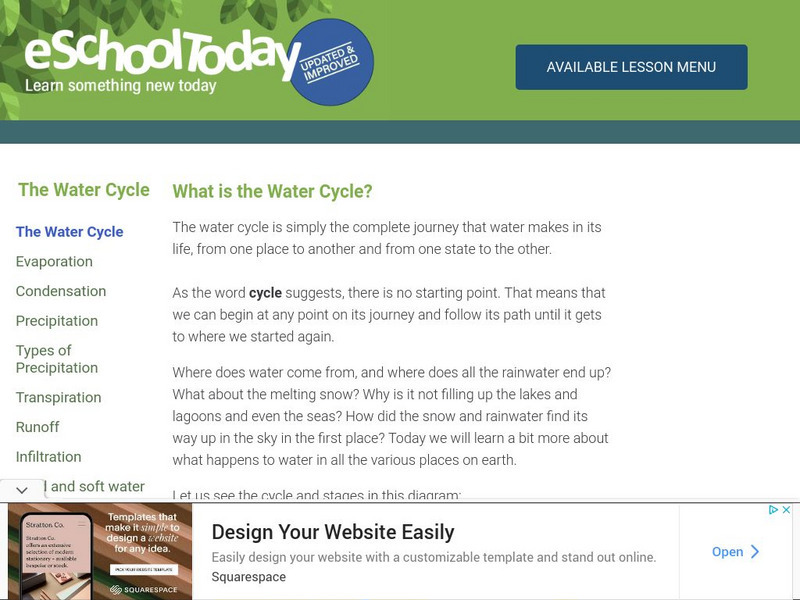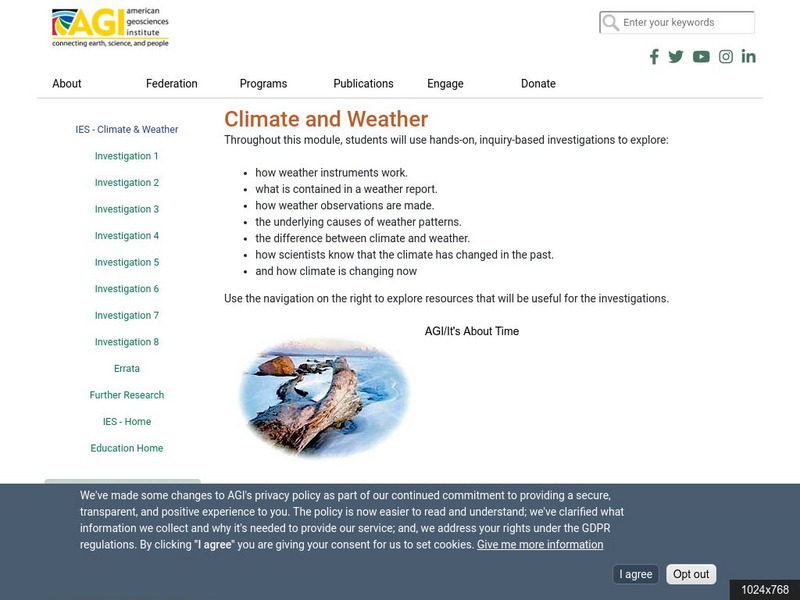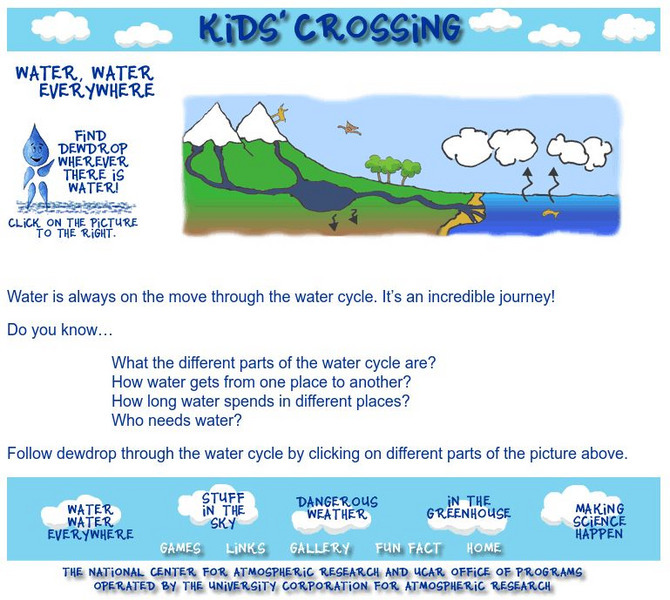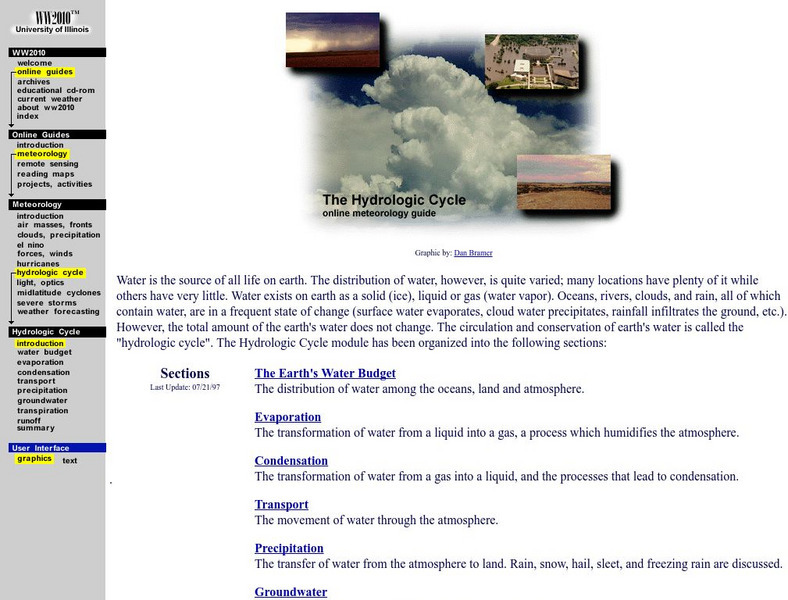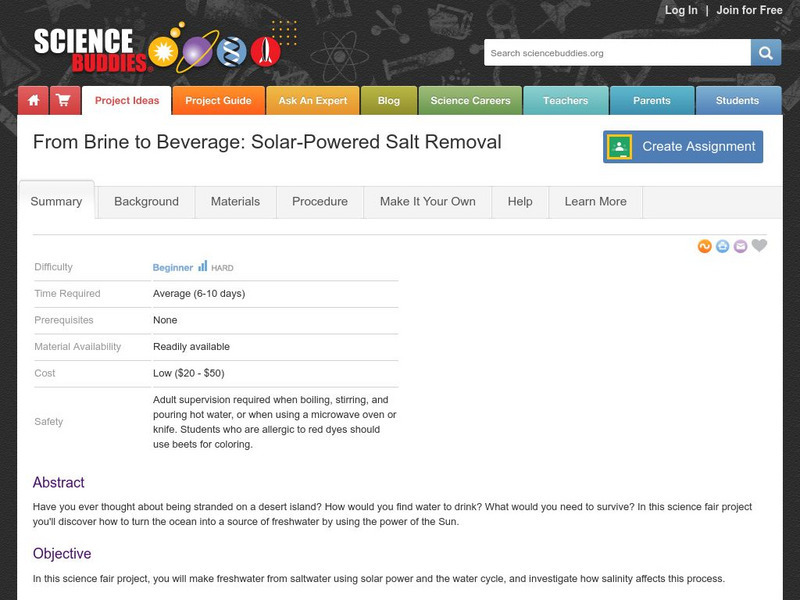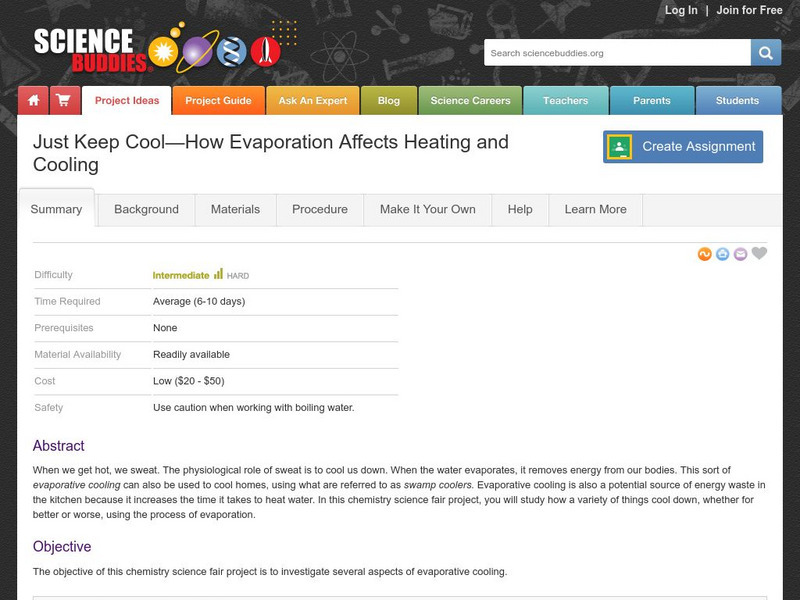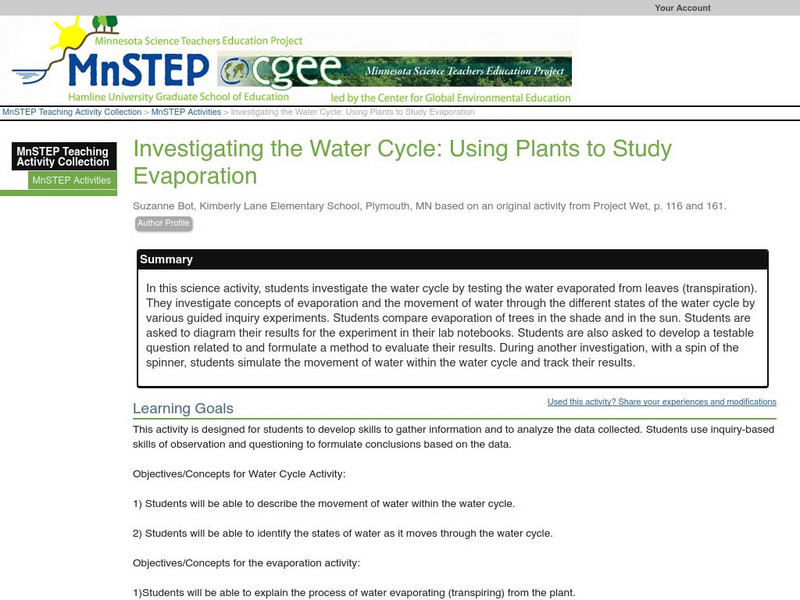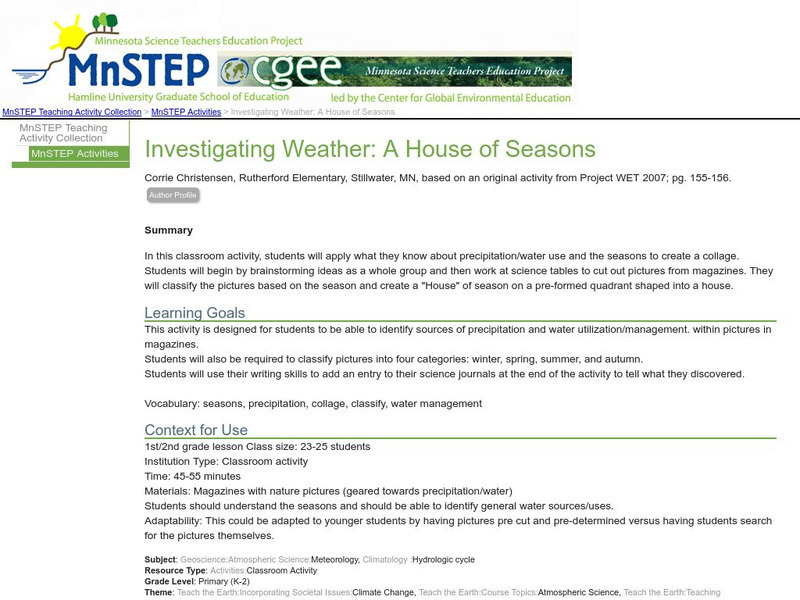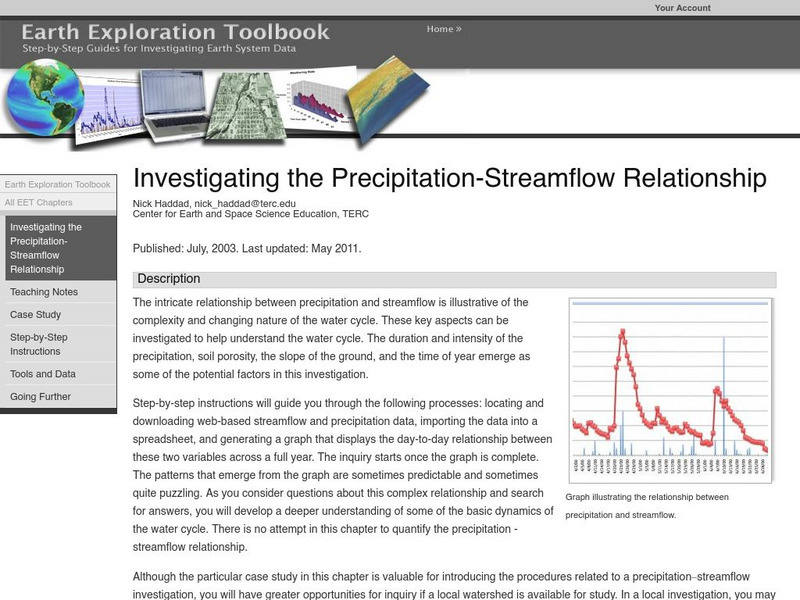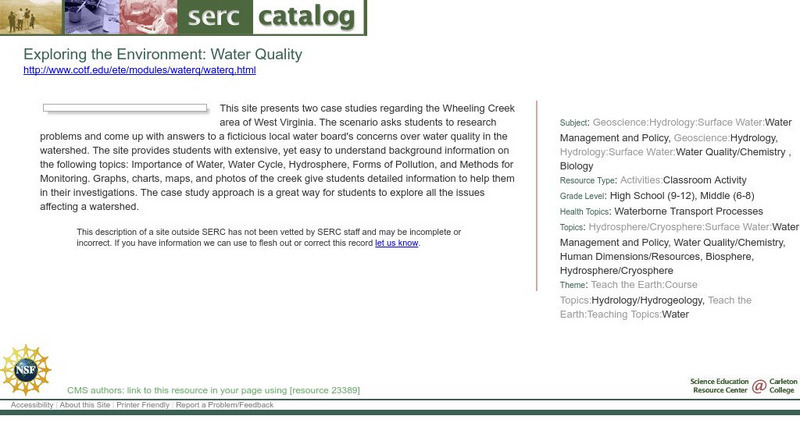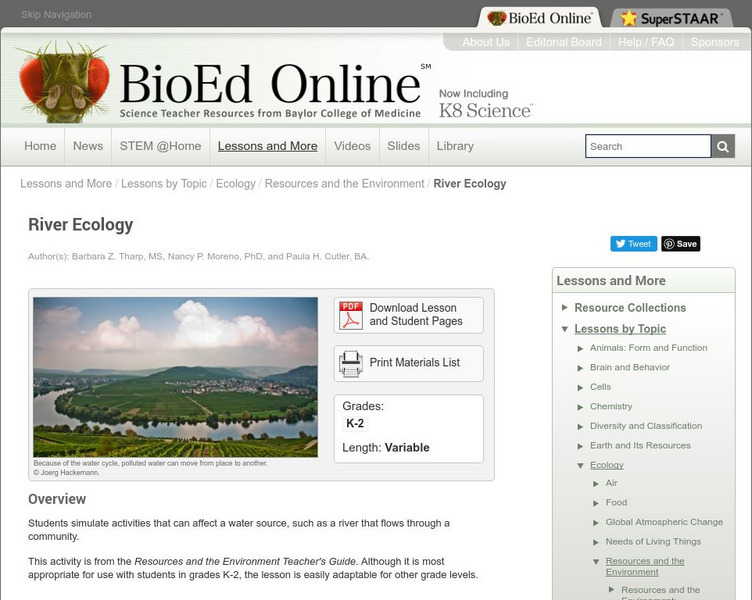Curated OER
The Water Cycle
Pupils observe and identify the stages of the water cycle by observing a simulated water cycle. They complete worksheets demonstrating their knowledge.
Curated OER
Water World Story
Fourth graders write a story about how a drop of water may have traveled to school. They design a presentation on the water cycle.
Curated OER
Disappearing Water
Students observe the amount of water in an open container over time, and they observe the amount of water in a closed container over time. They compare and contrast the sets of observations over time.
Curated OER
Tree Bagging
High schoolers bag trees to determine the mass of the water given off in the evapotranspiration process.
eSchool Today
E School Today: Your Revision Notes on the Water Cycle
Learn about the different stages of the Earth's water cycle, and about processes involving water, including runoff, infiltration, and the differences between hard and soft water.
eSchool Today
E School Today: Your Cool Basics on Water Shortage
Despite seventy percent of the world's surface being covered with water, there is a potential shortage of this natural resource. Only a small percentage is fresh water and much of that is inaccessible or threatened. Learn about fresh...
American Geosciences Institute
American Geosciences Institute: Climate and Weather
Eight hands-on lessons module in which students explore climate and weather. Inquiry-based investigations include observing weather, weather reporting, weather maps, weather satellites, causes of weather, and climate change.
PBS
Pbs Learning Media: Nisqually Glacier at Mount Rainier
Observe the Nisqually Glacier at Mount Rainier in this video segment from NatureScene. [4:07]
USA Today
Usa Today: Understanding Clouds and Fog
Learn about the different kinds of clouds, their location in the sky, how they form, their influence on the weather, and unusual cloud shapes.
University Corporation for Atmospheric Research
Ucar: Water, Water Everywhere
Dewdrop teaches the water cycle through this interactive map of rivers, oceans, groundwater, the atmosphere, and glaciers.
University of Illinois
University of Illinois Urbana Champaign: The Hydrologic Cycle
Water is the source of life on earth. It exists in many forms and is constantly changing. The circulation and conservation of earth's water is called the hydrologic (or water) cycle. Find out how water evaporates, condensates,...
Science Buddies
Science Buddies: From Brine to Beverage: Solar Powered Salt Removal
In this science fair project you'll discover how to turn the ocean into a source of freshwater by using the power of the Sun, and the water cycle. You will ultimately find just how salinity affects this process.
Science Buddies
Science Buddies: Just Keep Cool How Evaporation Affects Heating and Cooling
When we get hot, we sweat. The physiological role of sweat is to cool us down. When the water evaporates, it removes energy from our bodies. This sort of evaporative cooling can also be used to cool homes, using what are referred to as...
Science Buddies
Science Buddies: Keep Your Candy Cool With the Power of Evaporation!
Did you know that your body has a built-in cooler? And it might not be what you think. Sweat is produced when you are hot, but its purpose is actually to cool your body as the water in it evaporates from your skin. In this science fair...
Science Education Resource Center at Carleton College
Serc: Investigating the Water Cycle: Using Plants to Study Evaporation
In this science activity, students investigate the water cycle by testing the water evaporated from leaves (transpiration). They investigate concepts of evaporation and the movement of water through the different states of the water...
Science Education Resource Center at Carleton College
Serc: Investigating Weather: A House of Seasons
Using pictures from magazines, students will find sources of precipitation and water in this classroom activity. Students will then create a college of these pictures and group them based on the season.
Science Education Resource Center at Carleton College
Serc: Investigating the Water Cycle "Snow Fun"
In this teacher directed inquiry indoor lab students collect snow in a cup. They will estimate how much water will be in the cup after the snow melts. Students will then make predictions about what will happen to the cup of water. After...
Science Education Resource Center at Carleton College
Serc: Investigating the Precipitation Streamflow Relationship
The intricate relationship between precipitation and streamflow is illustrative of the complexity and changing nature of the water cycle. These key aspects can be investigated to help understand the water cycle. The duration and...
Science Education Resource Center at Carleton College
Serc: Exploring the Environment: Water Quality
A project based scenario where students research problems and come up with answers to a local water board's concerns over water quality in the watershed. Background information is accessible for the following topics: importance of water,...
Science Education Resource Center at Carleton College
Serc: Investigating the Water Cycle: Evaporation
In this water cycle activity, students investigate the evaporation process by participating in an outdoor evaporation experiment held on the school grounds. Students will determine where evaporation takes place the fastest and how nature...
Chase Young, PhD
Dr. Chase Young, Ph D: Reader's Theater Script: The Water Cycle [Pdf]
A reader's theater script for "The Water Cycle" is provided on this site. Nineteen speaking roles are needed in this script.
BioEd Online
Bio Ed Online: River Ecology
In this lesson plan students are required to simulate activities that can affect a water source, such a river as it flows from one place to another within a community.
BioEd Online
Bio Ed Online: Making a Water Cycle
In this lesson students are required to observe a simple model of the water cycle constructed of sand and ice in a plastic shoe box.
BioEd Online
Bio Ed Online: Why Is Water Important?
Provided here is a pre-assessment to gauge student's knowledge of the role and importance of water in their daily lives. Can be revisited as part of the post-assessment. Student sheets are provided in English and in Spanish.




